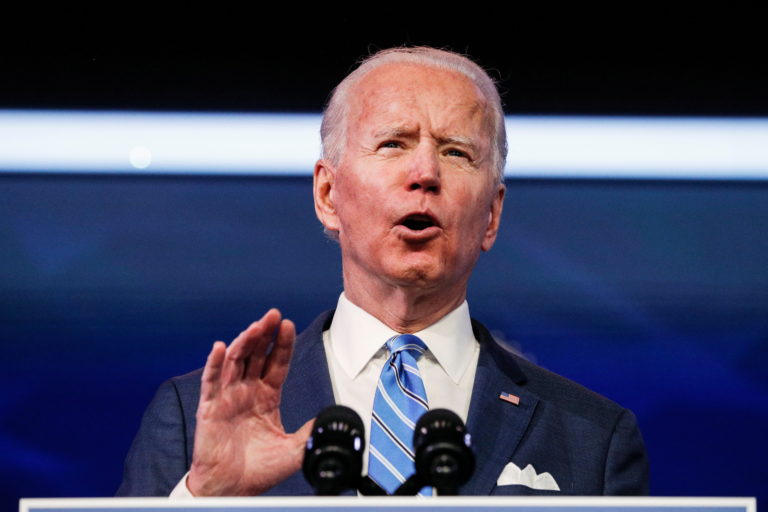Biden order streamlining path to citizenship for spouses could affect 40,000 Minnesotans
The order allows undocumented spouses and children to stay in the U.S. while pursuing a green card, removing a major source of stress for many mixed-status families.
by Hibah Ansari
Immigration advocates say a plan announced by the Biden administration this week could streamline the path to citizenship for thousands of undocumented spouses of U.S. citizens in Minnesota.
The plan allows undocumented immigrants the ability to “parole in place,” if they have lived in the U.S. for 10 or more years and are legally married to a U.S. citizen, meaning they can pursue legal status without leaving the country.
When Stephanie Kilpatrick Salazar, a leader for Latino advocacy organization Unidos, first read about the plan she was so shocked she thought it was spam. Kilpatrick Salazar’s husband from Mexico is currently trying to pursue status through marriage since she is a citizen. Their four children, ages 17, 13, 12, and 2, are also U.S. citizens.
“If everything goes as planned,” Kilpatrick Salazar said, “this could streamline that process for us and allow my husband to stay without having to go back to Mexico for his exit interview. It’ll be way less stress, less anxiety, and faster.”
While marriage to a U.S. citizen already opens a pathway to citizenship, the applicant is often required to first leave the country to apply for a green card. Biden’s decision will alleviate risks undocumented spouses face returning to their home country without a guarantee they could rejoin their families in the U.S.
The Department of Homeland Security estimates 500,000 undocumented spouses nationally will be eligible for the new program, as well as 50,000 of their children. Immigration experts say the pathway will offer relief to an estimated 40,000 spouses of U.S. citizens in Minnesota.
Homeland Security also estimates, on average, those eligible have resided in the United States for 23 years.
“This process will achieve family unity, one of our immigration system’s fundamental goals,” Secretary of Homeland Security Alejandro Mayorkas said in a statement. “It will also boost our economy, advance our labor interests, strengthen our foreign relations with key partners in the region, further our public safety interests, and more.”
Kilpatrick Salazar and her husband Rosendo Salazar began the green card process four years ago. They’ve had to prove their family exists by submitting taxes, records of bills, wedding photos, and photos from soccer games and other family events. They’ve also asked friends and family to write affidavits, sometimes five pages long. The application itself costs hundreds of dollars, not including attorney fees and the cost of obtaining biometrics such as fingerprints.
The mental cost, Kilpatrick Salazar said, has also been taxing.
“I’m a 16-year veteran public educator and my husband is a carpenter,” Kilpatrick Salazar said. “He’s built stadiums here, college campuses, and multimillion-dollar condos, and we’re just regular working-class people trying to raise a family. That gets lost in the rhetoric of all the negativity that looms around immigration.”
The last step is an interview and medical screening, but Salazar would have had to travel to Mexico to complete the process, with no guarantee he can return. Salazar has been living in Minnesota for 19 years.
While they’re waiting on an interview with immigration services, Kilpatrick Salazar said they could hear “at the drop of a hat,” and could only have two weeks to get to Mexico for the interview. Through Biden’s plan, their family can stay together in Richfield.
Carolina Ortiz, associate executive director of COPAL, another Latino advocacy organization in Minnesota, said Biden’s decision stresses the importance of keeping families together.
“Community members are sharing their fear of being apart from their families, because if they exit the U.S. they don’t know if they will be able to be with their families again,” Ortiz said. “This new announcement reaffirms that family unity is important.”
Ortiz said COPAL has already received dozens of calls at its worker center inquiring about the new immigration relief.
Immigration experts weigh in
Biden announced the policy on Tuesday, but the administration’s plan for accepting and screening applications won’t be revealed until later this summer.
Immigration advocates are trying to get word out about the timeline, said Julia Decker, policy director at Immigrant Law Center of Minnesota.
She added that folks who are undocumented will be able to stay together and maintain a sense of stability that is most important for children. Before this week, the process could sometimes keep families separated for as long as 10 years. Along with undocumented spouses, Biden’s plan will also apply to their noncitizen children.
“It’s hard to overstate how much the risk of that 10-year separation can be and how heavy that could weigh on families and children of those families,” Decker said.
Michele McKenzie of the Advocates for Human Rights said those interested in pursuing this pathway should wait for further official announcements from the president, and should avoid scammers claiming they can submit their application.
“The Biden administration’s step on parole in place is a step in the right direction,” McKenzie said. “It is hard to see that alongside a reduction in access to the fundamental human right to seek asylum from persecution.”
The move comes on the heels of the administration’s crackdown on immigration through the southern border. The Department of Homeland Security instituted a rule in May restricting asylum by speeding up the removal of migrants eligible for asylum. The rule drew criticism from immigration advocates nationwide.
“Immigration policies or existing measures should not be used for electoral reasons or political gains,” Ortiz said. “Instead, decision makers must see humanity in mixed-status families and recognize all of the blessings and benefits that migrants bring to every corner of the U.S.”


